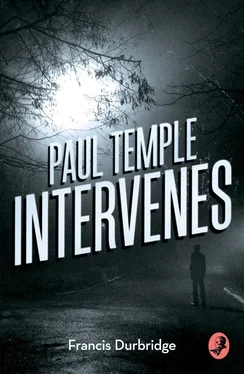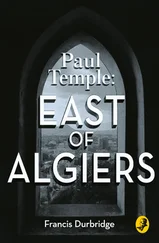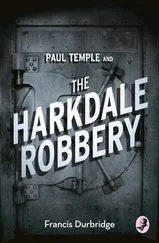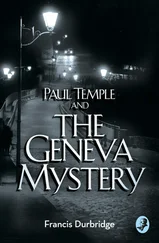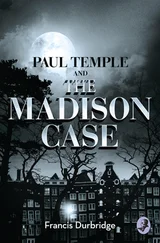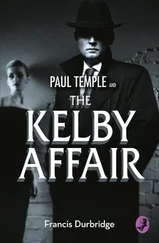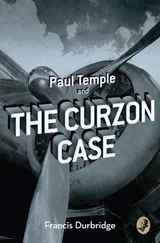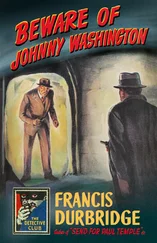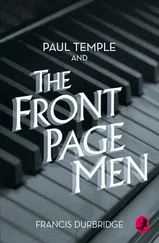FRANCIS DURBRIDGE

An imprint of HarperCollins Publishers
1 London Bridge Street
London SE1 9GF
www.harpercollins.co.uk
First published in Great Britain by
LONG 1944
Copyright © Francis Durbridge 1944
All rights reserved
Francis Durbridge has asserted his right under the Copyright,
Designs and Patents Act, 1988 to be identified as the author of this work
Cover design © HarperCollins Publishers Ltd 2015
Cover image © Shutterstock.com
A catalogue copy of this book is available from the British Library.
This novel is entirely a work of fiction. The names, characters and incidents portrayed in it are the work of the author’s imagination. Any resemblance to actual persons, living or dead, events or localities is entirely coincidental.
All rights reserved under International and Pan-American Copyright Conventions. By payment of the required fees, you have been granted the non-exclusive, non-transferable right to access and read the text of this e-book on screen. No part of this text may be reproduced, transmitted, down-loaded, decompiled, reverse engineered, or stored in or introduced into any information storage and retrieval system, in any form or by any means, whether electronic or mechanical, now known or hereinafter invented, without the express written permission of HarperCollins.
Source ISBN: 978-0-00-812562-2
Ebook Edition © June 2015 ISBN: 978-0-00-812563-9
Version: 2015-06-05
Contents
Cover
Title Page FRANCIS DURBRIDGE
Copyright An imprint of HarperCollins Publishers 1 London Bridge Street London SE1 9GF www.harpercollins.co.uk First published in Great Britain by LONG 1944 Copyright © Francis Durbridge 1944 All rights reserved Francis Durbridge has asserted his right under the Copyright, Designs and Patents Act, 1988 to be identified as the author of this work Cover design © HarperCollins Publishers Ltd 2015 Cover image © Shutterstock.com A catalogue copy of this book is available from the British Library. This novel is entirely a work of fiction. The names, characters and incidents portrayed in it are the work of the author’s imagination. Any resemblance to actual persons, living or dead, events or localities is entirely coincidental. All rights reserved under International and Pan-American Copyright Conventions. By payment of the required fees, you have been granted the non-exclusive, non-transferable right to access and read the text of this e-book on screen. No part of this text may be reproduced, transmitted, down-loaded, decompiled, reverse engineered, or stored in or introduced into any information storage and retrieval system, in any form or by any means, whether electronic or mechanical, now known or hereinafter invented, without the express written permission of HarperCollins. Source ISBN: 978-0-00-812562-2 Ebook Edition © June 2015 ISBN: 978-0-00-812563-9 Version: 2015-06-05
CHAPTER I: On the Air
CHAPTER II: River Patrol
CHAPTER III: Crisis at Scotland Yard
CHAPTER IV: The Girl Who Knew Too Much
CHAPTER V: No Beer for Sammy Wren
CHAPTER VI: Roger Storey Explains
CHAPTER VII: Death Stalks Forard Glen
CHAPTER VIII: Sir Felix Entertains
CHAPTER IX: Kellaway Manor
CHAPTER X: The Marquis Sends a Warning
CHAPTER XI: Greensea House
CHAPTER XII: Accidental Death?
CHAPTER XIII: Paul Temple Keeps an Appointment
CHAPTER XIV: ‘The Clockwise’
CHAPTER XV: Above Suspicion
CHAPTER XVI: Superintendent Bradley Goes to The Pictures
CHAPTER XVII: Concerning Inspector Ross
CHAPTER XVIII: The October Hotel
CHAPTER XIX: Introducing The Marquis!
About the Author
Also in This Series
About the Publisher
PAUL TEMPLE never failed to extract the utmost enjoyment from a trip to America; the inconceivable vastness of the continent with its astonishing gamut of civilisations appealed to his sensitive imagination. He was forever planning a novel of some considerable length dealing with the adventures of an Englishman in search of the hidden powers behind American life. So far, it was just an idea, just recognisable in the half-dozen random jottings in the notebook he invariably carried. And at the moment there did not seem to be much possibility of its materialisation into any substantial form. For Paul Temple was very busy indeed on his present trip to the United States.
It had started with an abrupt summons from Colonel Randall at the Ministry of Information. The Colonel had informed Temple that a few selected lecturers were being sent to the States in an effort to render that nation rather more ‘Britain conscious.’ It was essential that these lecturers should be known to the American public, and the M.O.I. had apparently been to some trouble to discover that the sale of Paul Temple’s novels in the States had long since passed six figures. Furthermore, a batch of newspaper cuttings had convinced them that the novelist-detective was also a man of action, who could be relied upon to use his initiative in any unorthodox situation.
So Paul Temple went to America. This time he took his wife with him, and when the lecture agency who made Temple’s arrangements discovered that Steve was also an author – of ‘The Front Page Men,’ which had enjoyed enormous popularity in the States, following the sensational reports of the activities of this gang of criminals in England – then Steve’s services were also very much in demand, and she was booked for a long series of lectures to women’s organisations of every description. So strange, indeed, were some of them that Steve felt that the association in question should be lecturing her on its peculiar origin.
However, Paul Temple and Steve ultimately arrived at Chicago. They marvelled at its luxury hotels, eyed its stockyards somewhat dubiously, walked the full length of the celebrated waterfront, and finally reached the luxurious portals of Station GSKZ, where Paul Temple was due to be interviewed on the air that evening by Cranmer Guest, whose reputation as radio’s ace interviewer conjured a thousand dollars from the pockets of his sponsors every time his programme went on the air.
This was the first time Temple had visited an American broadcasting station, though he had been on the air several times from the stately building that dominates Langham Place. Station GSKZ was a very different proposition however from the somewhat austere atmosphere of Broadcasting House.
It was five minutes to seven o’clock, and Paul Temple and Steve found themselves enveloped in the crowd which was surging through the foyer of the studios; it reminded the novelist of fighting for admission to a Hollywood premiere. There was apparently a theatre on the ground floor level, and a large notice near the door informed the visitors that the ‘Laughing Cavalier’ programme was to be broadcast from this particular auditorium at seven o’clock. Temple and Steve had some difficulty in avoiding being swept in with the mass of people who were presenting yellow tickets to the page-boy at the door. However, they eventually extricated themselves and headed for a desk in an opposite corner of the foyer which was marked ‘Information.’
The blonde in charge could best be described as ‘snappy’ in the more pleasant sense of the word.
‘Laughing Cavalier programme in the auditorium,’ she announced, mechanically before Temple could make any inquiry.
Читать дальше
